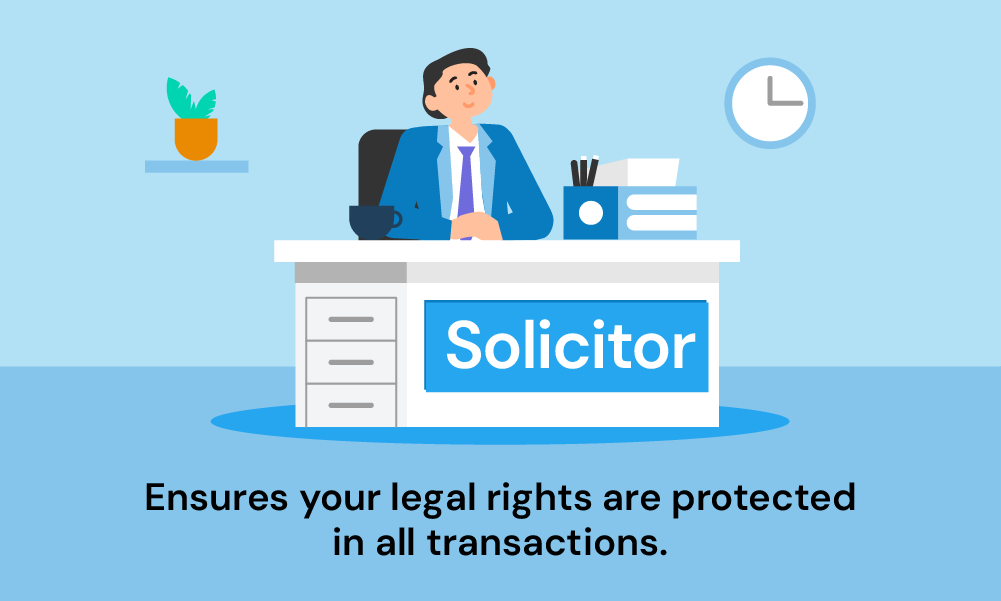- When Do You Need a Solicitor for Remortgaging?
- What Do Solicitors Do When Remortgaging?
- How Much Are Typical Solicitor Fees for Remortgaging?
- Top Tips for Finding An Affordable Remortgage Solicitor
- Will My Lender Let Me Choose My Own Solicitor?
- How To Save On Solicitor’s Fees When Remortgaging?
- The Bottom Line
Do I Need To Pay Solicitor Fees When Remortgaging?

Remortgaging your home can be a smart way to reduce your monthly mortgage payments or tap into your property’s equity.
But the process isn’t always straightforward.
One potential cost that often confuses homeowners is solicitor fees. Do you actually need to pay for a solicitor when remortgaging?
Let’s take a closer look.
When Do You Need a Solicitor for Remortgaging?
The main reason most people remortgage is to get a better interest rate and lower their monthly payments.
You don’t always need a solicitor for this type of straightforward remortgage with your existing lender. Here are the scenarios where solicitor fees do and don’t apply:
You Don’t Need a Solicitor If:
- You’re remortgaging with your current lender on a new rate or deal (known as a “product transfer“)
- You’re just taking out more money against your existing mortgage (a “further advance”)
In these cases, there is NO legal work required so your lender won’t charge any solicitor fees.
You Do Need a Solicitor If:
- You’re remortgaging to a different lender
- You’re adding or removing someone’s name on the mortgage
Essentially, any remortgage that involves transferring the legal ownership of the property requires the expertise of a conveyancing solicitor.
What Do Solicitors Do When Remortgaging?
Even though it’s not a full property purchase, there is still legal work involved when remortgaging to a new lender.
The solicitor’s role includes:
- Verifying your identity for anti-money laundering purposes
- Retrieving details of your current mortgage and outstanding balance
- Checking leasehold requirements if applicable
- Reviewing the new mortgage terms and conditions
- Conducting bankruptcy and property ownership searches
- Handling the transfer of mortgage funds between lenders
- Updating ownership records at the Land Registry
As you can see, having an experienced solicitor is crucial for ensuring the remortgage process goes smoothly and your interests are protected.

How Much Are Typical Solicitor Fees for Remortgaging?
Solicitor fees for remortgaging to a new lender typically cost between £300-£500 plus disbursements.
The disbursements are third-party costs like:
- Land Registry fees (£20-£65)
- Bankruptcy Search (£2)
- Property ownership searches (£3-£15)
So in total, you can expect to pay around £350-£600 in legal fees when using a solicitor for your remortgage.
Many mortgage lenders offer free or discounted legal packages as an incentive. But, lender-approved firms may not have your best interests as their top priority.
So it’s worth investigating if you can appoint your own, independent solicitor instead.
Top Tips for Finding An Affordable Remortgage Solicitor
Remortgage solicitor fees are typically lower than full conveyancing costs, even after disbursements (additional expenses).
However, it’s still wise to shop around to get the best value for a quality service. Here’s how:
- Compare quotes from multiple firms online – this is fast and free
- Check if they offer any discounts or bundles for remortgage clients
- Ask if they have any additional fees beyond the quoted price
- See if they are a member of the Law Society’s Conveyancing Quality Scheme
- Read independent reviews of their service levels
Spending a bit more for an experienced remortgage solicitor can pay dividends if they spot issues with the mortgage contract or speed up the process.
Will My Lender Let Me Choose My Own Solicitor?
Many lenders try to keep costs down by having a panel of approved solicitors or free legal firms that they want you to use.
But you are not obligated to go with their choice – especially if you are paying legal fees yourself.
When getting remortgage quotes, ask each lender if you can appoint your own solicitor. They may charge a separate legal fee, but it’s worth it for independence and peace of mind.
How To Save On Solicitor’s Fees When Remortgaging?
Solicitor fees can add up during remortgaging, but you can keep them under control. Here’s how:
- Get quotes from several solicitors. Compare their services and fees to find the best deal. Many offer free consultations to explain their pricing.
- Look for fixed-fee packages. These give you certainty about the total cost upfront.
- Consider your lender’s solicitor. They might offer free or discounted legal services, but check their offerings first.
- Negotiate. Tell them your budget and see if they can lower their fees, especially if you have other quotes.
- Watch out for hidden costs. Ask for a detailed breakdown of all charges to avoid surprises.
- Use a mortgage broker. They can recommend solicitors with competitive fees and might even have packages with discounted legal services.
- Do some of the legwork yourself. Gather and organise your documents beforehand. This saves the solicitor time and potentially reduces your fees.
Remember, saving money is great, but quality legal advice is crucial. Protect yourself by choosing a good solicitor.
The Bottom Line
Solicitor fees are a standard part of remortgaging to a new lender. They play a crucial role in protecting your interests throughout the process.
While an extra £350-£600 may sting initially, it’s a small price to pay compared to the potential savings over your mortgage term.
By understanding exactly when legal fees apply and shopping around for affordable yet quality conveyancing quotes, you can make remortgaging seamless and start saving money sooner.
Additionally, consulting a mortgage broker can further streamline the process. A broker can compare deals from various lenders, help you find the best rates, and guide you through the application process, saving you time and hassle.
Simply reach out to us, and we’ll connect you with a qualified mortgage broker to assist you in the remortgaging process.
Get Matched With Your Dream Mortgage Advisor...

Frequently asked questions
What do I need when remortgaging?
When remortgaging, you’ll need several documents: proof of identity (like a passport or driver’s licence), proof of address (such as a utility bill), details of your current mortgage, proof of income (like payslips or bank statements), and an up-to-date property valuation.
Additionally, you’ll need to provide details of any outstanding debts and financial commitments.
How long does the conveyancing process usually take in the case of a remortgage?
The conveyancing process for a remortgage usually takes between 4 to 8 weeks. This can vary depending on the complexity of your case and how quickly all parties involved can complete the necessary steps.
What is the easiest way to remortgage?
The easiest way to remortgage is to use a mortgage broker. A broker can compare deals from various lenders, help you find the best rates, and guide you through the application process. This can save you time and simplify the process significantly.
Is a solicitor required in a remortgage?
Yes, a solicitor or a licensed conveyancer is required for a remortgage. They handle the legal aspects of the process, including checking the new mortgage offer, ensuring the old mortgage is paid off, and registering the new mortgage with the Land Registry.
Do I need a solicitor if my ex-partner is remortgaging without me?
If your ex-partner is remortgaging to remove your name from the mortgage, you don’t need a solicitor personally, but it’s highly advisable to consult one.
This ensures your financial interests are protected and all legal matters are properly addressed.
How do I know if my solicitor is charging too much in remortgage fees?
To determine if your solicitor is charging too much in remortgage fees, compare quotes from multiple solicitors. Look for transparency in their fee structure, and check for any hidden charges. Online reviews and recommendations can also give you an idea of reasonable rates.
What should I do if my solicitor is bad with the job?
If your solicitor is performing poorly, address your concerns with them directly first. If this doesn’t resolve the issue, consider filing a complaint with their firm.
You can also seek advice from the Legal Ombudsman or consider switching to a different solicitor if necessary.
This article has been fact checked
This article was created, checked, and verified by the expert team at Money Saving Guru. Trust us, you’re in good hands.




